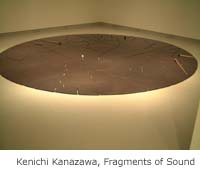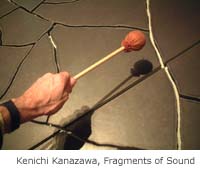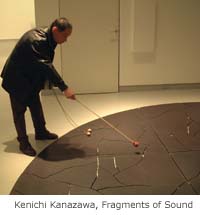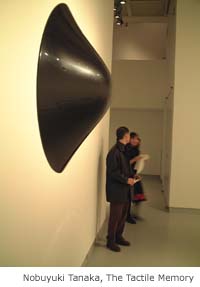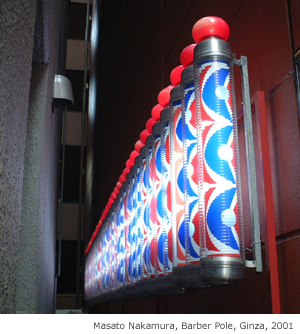
Looking like cracked plates of mud on a dried up riverbed, Kenichi
Kanazawa's sculpture resounds like a temple bell. A huge heavy disc of
steel has been cut in jagged lines and mounted on rubber feet. When struck
it acts like a Xylophone and each piece of steel resonates like a mellow
gong. Surrounding the large, circular, floor sculpture are various implements
to play on it Ð such as a Ping-Pong ball. When bounced across it, the
metal sculpture 'ding-dongs' out a tune as spiritual as any heard in sacred
ceremonies.
The exhibition life/art curated by Masaki Higuchi at the Shiseido Gallery
brings together 5 contemporary Japanese artists to explore the relationship
between art and life. An interesting aspect of the exhibition is that
it will be repeated with the same five artists annually over the next
five years. This is a long-term investment by the Gallery and the artists
involved. It should pay a handsome dividend for the art going public.
It is rare to see the development of artists in any consistent framework
as this series of exhibition promises.
Masato Nakamura's installation is part of the exhibition but tucked away
between two buildings on the street. Secreted, in those uniquely Tokyo,
less-than-a-meter gaps between buildings, are 50-illuminated barber's
poles. The spiraling red, white and blue poles flash out their message
of an open hairdressing salon, to a passing trade of no one. In this dark
narrow chasm they exist in a no mans land between their original use as
signs and their new life as art objects. By choosing this site for this
work, Nakamura cleverly creates a tension regarding the sign status as
art. This examination of the nature of art is at the core of this fascinating
exhibition.
Nobuyuki Tanaka's piece 'The Tactile Memory' is a huge black blob-like
form growing from the wall. The object is an enigma. While appearing as
if formed from an industrial mould it is in fact made from laquerware.
The piece questions the artificiality of borders between art and craft.
Hajime Imamura's work 'aru KATACHI 2001-11' includes a life-size cast
of the artist surrounded by various wall mounted objects. The piece questions
our perceptions of reality.
Yoshiro Suda specializes in an art of deception. His work consists of
apparently plastic flowers cunningly placed in quiet spots in art galleries.
But no, these flowers are painstakingly carved from wood and painted to
life. Suda's secretive flowers are an art ambush. His hand-craft skills
amaze the general public while ridiculing the art world who have spent
a century 'learning' to embracing the 'readymade' object Ð the plastic
flower -- as art.
Suda's simple floral insertions bring into question the artificiality
of gallery spaces and undermine the elitism so prevalent with much contemporary
art. Over the next five years, it will be a pleasure to note the reflections
of these artists, not only on life around them, but on the state of contemporary
art.
